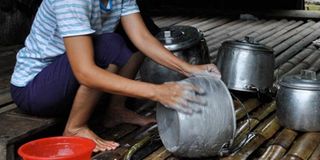What you ought to know before you use steel wool

Experts warn that scratches from the flecks of steel wool can turn septic if left unattended to.
What you need to know:
Steel wool has been a part of everyday life for millions of Ugandans. Steel wool pads are the ultimate scouring product for dishes, pots, pans in many homes. It is supposedly inert, safe, non-toxic, non-reactive and nonflammable how true are these assertions?
I was having the time of my life as I savoured the last piece of liver on my plate at a restaurant last week.
I was about to ask for an extra helping until my eyes landed on shining particles swimming on the corners of the gravy. I pulled my plate closer to my eyes to be sure I was not imagining things and lo and behold, it was steel wool.
I did not know what to do or what to expect but immediately I suspended eating the food. I did not know whether the bits I had seen were the only ones or whether I had inevitably ingested some bits of steel wool.
I tried to cough with the hope that some particles would come back but nothing did. I thought of going to the hospital but I did not know what to tell the medical officers and if they would take my fears seriously.
Stories of steel wool being found in food had remained a mystery to me until I had that experience. This was all the motivation I needed to find out more answers.
What next after ingesting steel wool flecks?
Consequences arising from ingesting steel wool flecks do not manifest immediately. They usually present signs after a long period of time according to experts.
This is attributed to the body processing mechanism. According to Esther Akoth, a clinical officer, if one does not pay keen attention to their body response, some of these signs will only be recognised in advanced stages when there is little to reverse the symptoms.
Akoth recommends that the immediate treatment upon realisation of steel wool consumption is to drink milk because it will help soften these particles for them to smoothly be excreted from the body.
Most people tend to eat solid foods like posho to push down the steel wool stuck at their throat and this most times works but do you realise that it may get stuck at the organs you are pushing it to, also.
If the particles get stuck in the throat and can be felt when swallowing or there is stomach pain, then an scan is recommended to rule any other underlying factors. However, sometimes these steel flecks can be passed out in the stool.
She, however points out that because the body has a self-cleansing mechanisms, some of these substances are passed out as sweat or through urine.
Experiences
Moreen Asiimwe, a resident of Wabigalo Parish in Kisugu, a Kampala suburb says from as far back as she can remember “steel wire” is what her household uses to scrub saucepans.
Much as she is aware that not all the steel wool she uses can be easily rinsed out of her saucepans, she says that she cannot imagine washing her saucepans without using it.
“When I use steel wool, the saucepans become so clean, shiny and look new. After using ordinary steel wool, I use a sponge with soap to wash out the steel wool particles that could have remained in it,” she shares.
Unlike Asiimwe, Flavia Nabanoba, a house wife who also stays in the same area, explains; “In the past, I used to wash my saucepans with ordinary steel wool. Whenever I left it (steel wool) exposed on the outside, I would find it rusty. When I used the same piece again, I would find very many small rusty particles beneath the saucepan. I decided to stop using it and look for something better because I never wanted my family to develop complications.”
However, Joyce Bikala, a restaurant operator rubbishes Nabanooba’s claims. She says provided one uses scented soap, there is no way the particles will remain in the saucepan.
Experts’ opinions
According to Dr Busingye Tusasirwe, a general practitioner, “Steel wool is made out of elementary iron. The iron cannot be absorbed into the blood, therefore he sees there are no risks related with the use of steel wool as a scrubbing device,” Dr Busingye says, “Since the particles are very small, they can always be passed out in the stool.”
However, Dr Alex Mugalu of Mulago hospital has a different take altogether.
He says steel wool if ingested is likely to affect the alimentary canal. “The foreign body in the alimentary canal can cause an abnormal reaction because the particles are prickly and can cause pus,” he says.
Dr Mugalu explains that the prickly particles can also cause bleeding and in some cases result into ulcers, although he is uncertain whether cancer would develop.
Esther Akoth, a clinical officer explains that steel wool being just left in the open rusts and if ingested can cause great damage.
“Once consumed in food, the tiny steel wool particles leave particles right from the mouth through to the throat, liver or intestines which could cause affect those parts as well as fistulas in extreme cases.”
Akoth further cautions that some of these risks could be minimised with controlled usage. “Many people forget that most things need to be used for a given time frame because they want to save money and when it comes to things like steel wool, it should have a short lifespan in the kitchen.”
Akoth warns, “esophageal scratching when left untreated can lead to infections which can still result into loss of your voice and when rusted steel wool breaks into your skin when using it to wash, it may cause tetanus when not attended to as well.”
Precautions
Caution should always be taken in situations where people’s health could be in danger, for instance when washing the saucepans, it is necessary to rinse saucepans thoroughly so that these steel wool particles do not pass onto the food you are to cook in that saucepan.
Better still, Akoth recommends avoiding using steel wool for long or even other safe dish scrubbing alternatives can be used like use of sand.
Alternatives
Dr Mugalu advises washing utensils with traditional methods like plants, ash and sand. However, there are also scrubbing pads which are available in all supermarkets in various sizes at different prices starting from as low as Shs500 a piece. These pads can be rinsed out and used over and over. They are resistant to the chemicals and will not rust.
Research
One thing that all the experts we talked to agree upon is that there is need for more research on the risks that steel wool poses both in the long and short as there are limited studies on the same.
According to the World Health Organisation, an increasing number of young Ugandans are dying of non-communicable diseases caused by poor lifestyle choices.




